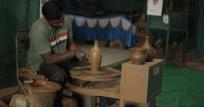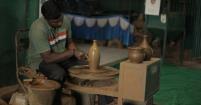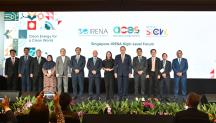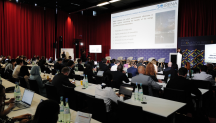

In Solar Energy, a Pottery Maker Sees Hope
Newsletter
Thirty-five-year-old Mahesh Kumbhar’s hands move deftly as he moulds a lump of clay into an intricate piece of pottery. At his renovated workshop in the village of Bettahalasur, about 25 km from Bengaluru (formerly Bangalore), he and his wife Sowmya are beaming with pride and satisfaction at their success in doubling their production using solar-powered modern pottery tools.
“We can now accept orders for up to 75 items every day and have introduced a variety of new products, including water bottles and jugs, cooking pots, teacups, flower vases, lamps, and idols,” he says.
In the past, when Mahesh used the manual pottery tools, he struggled to make ends meet. With a meagre monthly income of US $362, he was finding it difficult to sustain his family. Primarily, this was because manual pottery making is labour intensive involving a significant amount of drudgery. In addition, he lost an average of 20 per cent of his production every time he baked the pottery, which is the last step in preparing the product for the market. “With the conventional wheel, in spite of slogging for hours, I could hardly make 30 items a day,” he says.

In 2018, the non-profit SELCO Foundation, through their social entrepreneurship model, intervened to help Mahesh with efficient solar powered tools aimed towards reducing the daily drudgery. The solution: A solar powered pottery wheel, along with a blunger – for mixing clay and water – and pugmill, used to blend the clay. The blunger and pugmill catalyse fast clay mixing and the direct current pottery wheel helps scale up the production. The SELCO Foundation also renovated Mahesh’s workspace to provide an easy workflow with appropriate storage and passive methods for smoke extraction to ensure more productive work hours. A fuel-efficient kiln was constructed at the workshop, and cool roofing paint was used to maintain an ambient temperature.
These simple solutions have had a profound impact on Mahesh’s operations and income. The use of the redesigned tools has shortened the time needed to mould pottery by 60 per cent and boosted fuel efficiency by 40 per cent. Using the energy-efficient solar kiln has reduced wood use by 15 per cent and smoke emissions by 30 per cent, while helping the ready items dry faster. On top of that, Mahesh now loses an average of only 2 per cent of his work, once the pottery is in the kiln.
In 2022, IRENA partnered with the SELCO Foundation to develop a “Fostering Livelihoods with Decentralised Renewable Energy” report that explores how energy access programmes and initiatives tackle the various ecosystem components to sustain and strengthen existing livelihood activities or facilitate new ones. In February 2023, during his India mission, IRENA Director-General Francesco La Camera visited livelihood projects run by the SELCO Foundation and saw first-hand a variety of solar powered solutions that are helping micro-businesses in the rural communities.
Since the SELCO Foundation’s intervention, Mahesh has seen a continuous improvement in his monthly income because of the increase in production. Today, he sells more than 2,000 pottery products a month across several cities in southern India and his monthly income has now more than doubled to US $850. In the last four years, he has developed a sizable clientele and now has three retail outlets in Bengaluru.




